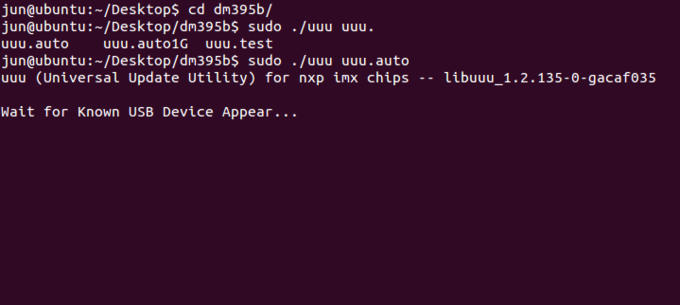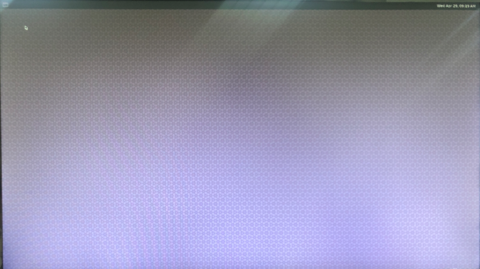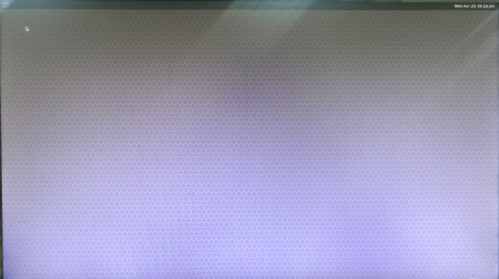Difference between revisions of "How to Restore Yocto Linux to the eMMC on EBOX-IMX8MM"
From ICOP tech wiki
Eveshih0725 (talk | contribs) |
|||
| (22 intermediate revisions by 2 users not shown) | |||
| Line 1: | Line 1: | ||
| − | {{#vardefine:RELEASE_PARAM|{{#urlget:release}}}} | + | {{#vardefine:RELEASE_PARAM|{{#urlget:release}}}} <!-- |
| + | --> {{#lst:Yocto_Platform_Customization|{{#var:RELEASE_PARAM|RELEASE_MORTY_V1.0_DART-6UL}}}} <!-- | ||
| + | --> {{PageHeader|How to Restore Yocto Linux to the eMMC on EBOX-IMX8MM}} | ||
| + | ==<big>Restore the Yocto Linux via Linux host PC to the EBOX-IMX8MM</big>== | ||
| + | ===Tools you need before restoring the image to the eMMC:=== | ||
| − | + | *<u>Recovery image</u> with the <u>UUU burning software</u>: | |
| + | **1GB RAM version:https://ftp.icop.com.tw/share/en7pLp4e | ||
| + | **2GB RAM version:https://ftp.icop.com.tw/share/iRJSN9mp | ||
| − | * | + | *A 64-bit Linux host O/S on a PC (The virtual machine is not suggested to be used) |
| − | * | + | *USB cable to connect between the host PC and the EBOX-IMX8MM. (Ex: USB to micro USB) |
| − | * | + | |
| + | ===Write the image to the eMMC on the EBOX-IMX8MM.=== | ||
| + | |||
| + | *This section will introduce how to write the image to the eMMC on the EBOX-IMX8MM step by step. | ||
| + | *Find the SW1 on the EBOX-IMX8MM and change the setting to Serial Download Mode according to the photo below: | ||
| + | |||
| + | [[File:EBOX-IMX8MM SW.jpg|alt=|frameless|800x800px]] | ||
| + | |||
| + | *Turn on the host PC and unzip the image file in it. | ||
| + | *Connect the USB to micro USB to the host PC, but not connect to the EBOX-IMX8MM. | ||
| + | *Open a terminal on the host PC and access the location you’ve put the image file and input "sudo chmod a+x uuu" to enable uuu as executable command. | ||
| + | *Input “sudo ./uuu uuu.auto” ; you will see “Wait for known USB Device Appear” | ||
| + | |||
| + | [[File:Yocto-1.2.5.png|frameless|680x680px]] | ||
| + | |||
| + | *Connect the Micro USB to the EBOX-IMX8MM, and it will trigger the serial download mode to restore the image from the host PC. | ||
| + | *After the restore process is done, it will show on the host PC as the image below: | ||
| + | |||
| + | [[File:Yocto-1.2.7.png|frameless|680x680px]] | ||
| + | |||
| + | *Remove the USB to Micro USB cable on the EBOX-IMX8MM (Power off), and set the SW1 to Internal boot as below. | ||
| + | |||
| + | [[File:EBOX-IMX8MM SW2.jpg|alt=|frameless|800x800px]] | ||
| + | |||
| + | *Power on the EBOX-IMX8MM and you can see the Yocto Linux booting. | ||
| − | + | [[File:1-2-11.png|frameless|480x480px]] | |
| − | |||
| − | + | <br /> | |
| − | + | ==<big>Restore the Yocto Linux via Win10 host PC to the EBOX-IMX8MM.</big>== | |
| − | + | ===Tools you need before restoring the image to the eMMC:=== | |
| − | * | + | *<u>Recovery image</u> with the <u>UUU burning software</u>: |
| − | * | + | **1GB RAM version:https://ftp.icop.com.tw/share/en7pLp4e |
| + | **2GB RAM version:https://ftp.icop.com.tw/share/iRJSN9mp | ||
| + | *A Windows 10 host O/S on a PC (The virtual machine is not suggested to be used) | ||
| + | *USB cable to connect between the host PC and EBOX-IMX8MM.(Ex: USB to micro USB) | ||
| − | + | ===Write the image to the eMMC on the EBOX-IMX8MM.=== | |
| + | This section will introduce how to write the image to the eMMC on the EBOX-IMX8MM step by step. | ||
| − | |||
*Find the SW1 on the EBOX-IMX8MM and change the setting to Serial Download Mode according to the photo below: | *Find the SW1 on the EBOX-IMX8MM and change the setting to Serial Download Mode according to the photo below: | ||
| + | |||
| + | [[File:EBOX-IMX8MM SW.jpg|alt=|frameless|800x800px]] | ||
| + | |||
| + | *Turn on the host PC and unzip the image file to it. | ||
| + | *Connect the USB to micro USB cable to the host PC, but not connect to EBOX-IMX8MM. | ||
| + | *Open a terminal on the host PC and access the location you’ve put the image file and input “uuu.exe uuu.auto” , and you will see “Wait for known USB Device Appear”. | ||
| + | |||
| + | [[File:Yocto-2.2.4.png|frameless|670x670px]] | ||
| + | |||
| + | *Connect the Micro USB to the EBOX-IMX8MM, and it will trigger the serial download mode to restore the image from the host PC. | ||
| + | *After the restore process is done, it will show on the host PC as the image below: | ||
| + | |||
| + | [[File:Yocto-2.2.6.png|frameless|690x690px]] | ||
| + | |||
| + | *Remove the USB to Micro USB cable on the EBOX-IMX8MM (Power off), and set the SW1 to Internal boot as below. | ||
| + | |||
| + | [[File:EBOX-IMX8MM SW2.jpg|alt=|frameless|800x800px]] | ||
| + | |||
| + | *Power on the EBOX-IMX8MM and you can see the Yocto Linux booting. | ||
| + | |||
| + | [[File:1-2-11.png|frameless|499x499px]] | ||
<br /> | <br /> | ||
Latest revision as of 20:47, 27 December 2023
How to Restore Yocto Linux to the eMMC on EBOX-IMX8MM
Contents
Restore the Yocto Linux via Linux host PC to the EBOX-IMX8MM
Tools you need before restoring the image to the eMMC:
- Recovery image with the UUU burning software:
- 1GB RAM version:https://ftp.icop.com.tw/share/en7pLp4e
- 2GB RAM version:https://ftp.icop.com.tw/share/iRJSN9mp
- A 64-bit Linux host O/S on a PC (The virtual machine is not suggested to be used)
- USB cable to connect between the host PC and the EBOX-IMX8MM. (Ex: USB to micro USB)
Write the image to the eMMC on the EBOX-IMX8MM.
- This section will introduce how to write the image to the eMMC on the EBOX-IMX8MM step by step.
- Find the SW1 on the EBOX-IMX8MM and change the setting to Serial Download Mode according to the photo below:
- Turn on the host PC and unzip the image file in it.
- Connect the USB to micro USB to the host PC, but not connect to the EBOX-IMX8MM.
- Open a terminal on the host PC and access the location you’ve put the image file and input "sudo chmod a+x uuu" to enable uuu as executable command.
- Input “sudo ./uuu uuu.auto” ; you will see “Wait for known USB Device Appear”
- Connect the Micro USB to the EBOX-IMX8MM, and it will trigger the serial download mode to restore the image from the host PC.
- After the restore process is done, it will show on the host PC as the image below:
- Remove the USB to Micro USB cable on the EBOX-IMX8MM (Power off), and set the SW1 to Internal boot as below.
- Power on the EBOX-IMX8MM and you can see the Yocto Linux booting.
Restore the Yocto Linux via Win10 host PC to the EBOX-IMX8MM.
Tools you need before restoring the image to the eMMC:
- Recovery image with the UUU burning software:
- 1GB RAM version:https://ftp.icop.com.tw/share/en7pLp4e
- 2GB RAM version:https://ftp.icop.com.tw/share/iRJSN9mp
- A Windows 10 host O/S on a PC (The virtual machine is not suggested to be used)
- USB cable to connect between the host PC and EBOX-IMX8MM.(Ex: USB to micro USB)
Write the image to the eMMC on the EBOX-IMX8MM.
This section will introduce how to write the image to the eMMC on the EBOX-IMX8MM step by step.
- Find the SW1 on the EBOX-IMX8MM and change the setting to Serial Download Mode according to the photo below:
- Turn on the host PC and unzip the image file to it.
- Connect the USB to micro USB cable to the host PC, but not connect to EBOX-IMX8MM.
- Open a terminal on the host PC and access the location you’ve put the image file and input “uuu.exe uuu.auto” , and you will see “Wait for known USB Device Appear”.
- Connect the Micro USB to the EBOX-IMX8MM, and it will trigger the serial download mode to restore the image from the host PC.
- After the restore process is done, it will show on the host PC as the image below:
- Remove the USB to Micro USB cable on the EBOX-IMX8MM (Power off), and set the SW1 to Internal boot as below.
- Power on the EBOX-IMX8MM and you can see the Yocto Linux booting.







